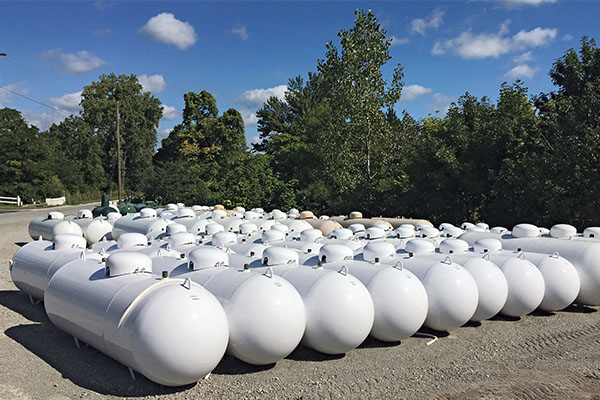Well-managed tanks send a powerful message
Few things speak louder about how well a propane company is managed than customer tanks. A decaled tank next to a defunct business, surrounded by trees and weeds and left to rust, causes one to ask why that marketer did not pick up the tank. The same can be asked about a bulk plant filled with carelessly placed rusted tanks.

Photo by LP Gas staff
On the flip side, a bulk plant with organized, clean and painted tanks sends the powerful message of the propane company’s competitiveness and operational excellence.
Effective tank management is complex. As quantities increase, tanks are scattered and are often moved or need to be resized. Tank management tests the level of discipline and accountability of any propane company.
Tank management touches almost every aspect of a propane business and requires that each of the following be addressed:
1. Tank appearance: Tanks are an important company billboard. They must be set and decaled properly; all of them must be painted and cleaned in time. As many homeowners do not like having a tank in their yard, they certainly will not like a rusted, dirty tank. Propane marketers who take care of their tanks will create competitive advantages.
2. Financial control: Customer tanks are usually the largest investment and require the financial disciplines of accounting and return on investment.
Monthly verifications of tank activity and having tanks on-hand are essential controls. Bar coding of tanks is not an industry standard – another example of our industry’s slow adoption of information technology.
3. Right sizing: Bobtail scheduling, propane supply reliability, customer service and tank return on investment are all impacted by having the right tank size at the customer location. The right tank size changes as appliances become more efficient and with the customer’s uses of propane.
4. Legal: Protecting the ownership of the tank with an executed lease agreement and, in the case of an underground tank, a current UCC filing is essential.
5. Safety: Tanks must be set according to safety code. Underground tanks require cathodic protection.
Few enjoy the work associated with managing tanks – painting and cleaning, counting in the yard and executing signed lease agreements. Also, marketers often procrastinate the expense and time-consuming work because of other priorities. As a result, propane marketers may fall behind in the management of tanks and become a victim of the “pay me now or pay me later” dynamic.
Steps forward
To avoid the trap of falling behind, owners and managers of propane operations should make tank management one of the company’s ongoing priorities by doing the following:
1. Remind the entire staff, especially key people, that:
- Tanks are the company’s billboard – establish the standard that all installed tanks must look good and be set with professional care. Drivers and technicians who see tanks in disrepair or improperly installed should report them to management.
- The large financial investment in tanks requires gallon throughput analysis, proper accounting and legal protection.
2. Establish an annual discipline that includes:
- Painting a defined number of tanks.
- Performing cathodic tests.
- Identifying tanks without sufficient gallon throughput; they should be either right sized, picked up or assessed fees. Customers can also add burner tips that increase gallons.
3. Plan to spend resources each year on paint, equipment and employee time to paint, clean and right size tanks. Assign this summer task without apology or excuse. The work must be done.
If you are behind in your tank management, do not panic. Create a multi-year plan and stick to it. Your investment in tanks will improve your company’s reputation, business value and employee morale.
Randy Doyle is a 35-year, semi-retired veteran of the propane industry who consults with Holtzman Propane in Mt. Jackson, Virginia. He is a member of the NPGA board of directors and the PERC council, and is active in the Virginia Propane Gas Association.
















